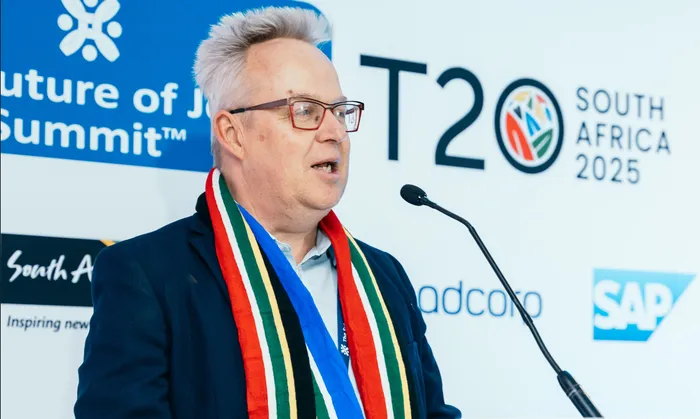
Dr Nik Eberl is the Founder & Executive Chair: The Future of Jobs Summit™ (Official T20 Side Event) .He will be writing a regular column in Business Report.
Image: Supplied
When South Africa’s Cabinet approved the nation’s bid to host a Formula 1 Grand Prix at Kyalami beginning in 2027, it marked more than a moment of motorsport nostalgia—it was a powerful statement of intent for the country’s socio-economic future. The announcement, confirmed on 5 September 2025, commits to a three-year hosting term, fully financed by the private sector, with the aim of catalysing job creation and economic growth.
Relighting a Legendary Circuit
Kyalami is no stranger to speed. From hosting its first Grand Prix in 1967 to welcoming the final South African races in the early 1990s, the circuit has seen legends like Niki Lauda, Alain Prost, and Jody Scheckter cross its finish line.
Now, the FIA has greenlit upgrades to elevate Kyalami to Grade 1 status—without altering its unique layout. This is not just a nod to heritage—it signals South Africa’s re-emergence onto the global motorsport map.
Racing Towards Economic Revitalisation
An F1 race of this magnitude promises a powerful economic ripple effect. Projections suggest the event could inject R1 billion into the local economy, fuelled by tourism, hospitality, and global media exposure. With costs estimated at R2 billion annually—funded privately—brands such as MTN, MultiChoice, Heineken, and corporate heavyweights like Johann Rupert are already at the table.
But beyond the economics, the Grand Prix offers something far more profound: the opportunity to use F1 as a platform for youth empowerment.
Legacy Beyond the Track: Youth Development and Skills
1. Lewis Hamilton’s Legacy and Why It Matters Here
No figure embodies F1’s push for inclusion more than Lewis Hamilton, the sport’s only Black driver and a seven-time world champion. Through the Hamilton Commission and the Mission 44 Foundation, he has worked to break barriers in motorsport—championing STEM education, creating pathways for underrepresented youth, and advocating for systemic diversity in engineering, racing, and management.
Hamilton himself has said: “The time’s 100% right… Why are we not on that continent?” His advocacy for a Grand Prix in Africa has never been about spectacle alone—it is about opportunity. Hosting F1 in South Africa allows us to plug into these global youth initiatives and adapt them to local contexts: scholarships, apprenticeships, and mentorship programmes that connect township youth to a global industry.
2. F1’s Global ‘We Race As One’ Programme
F1’s own “We Race As One” initiative was launched in 2020 to drive diversity, equality, and inclusion. It includes partnerships with universities, youth training projects, and scholarships for aspiring engineers from underrepresented communities. Bringing the Grand Prix here ensures that South African youth—particularly women and those from disadvantaged backgrounds—are positioned to benefit from those global pathways.
3. Skills Transfer and Enterprise Development
The construction, logistics, and staging of the event require thousands of hands—from engineers and mechanics to media professionals, hospitality workers, and entrepreneurs. With the right planning, these roles can serve as skills accelerators for young South Africans. Imagine training programmes in motorsport engineering at TVET colleges, internships in race management, and incubators for local SMMEs to service the event.
4. Inspiration and Representation
For many young South Africans, motorsport has always felt inaccessible. But F1 in Kyalami can shift that perception. Youth from Soweto, Umlazi, and Khayelitsha could see not just international drivers, but also local engineers, marshals, and managers playing visible roles on the global stage. That representation matters: it shows that a young person’s dream is not limited by geography.
A Call to Action
The Cabinet’s approval to bid for—and potentially host—the Formula 1 Grand Prix at Kyalami from 2027 is more than a triumphant return of motorsport. It is a platform to embed youth development into the very DNA of the event.
If South Africa aligns its efforts with Lewis Hamilton’s vision, the Hamilton Commission’s recommendations, and F1’s We Race As One initiative, the legacy will be greater than podium finishes. It will be measured in scholarships awarded, careers launched, skills transferred, and dreams ignited.
Business and government must come together—before the first car lines up on the grid—to sign a Youth Development Accord with Formula 1. This Accord must guarantee that:
This is how you measure legacy—not by how many Ferraris park at Sandton hotels, but by how many young South Africans step into new careers because F1 came to Kyalami.
Final Lap
South Africa doesn’t need another global event that burns bright and fades. It needs a youth accelerator disguised as a Grand Prix. If we align with Hamilton’s vision, and hold F1 accountable to its own promises, Kyalami 2027 could be remembered not only as the year motorsport returned—but as the year South Africa put its youth in pole position
Dr Nik Eberl is the founder & Executive Chair: The Future of Jobs Summit™ (Official T20 Side Event). Author: Nation of Champions: How South Africa won the World Cup of Destination Branding
*** The views expressed here do not necessarily represent those of Independent Media or IOL.
BUSINESSS REPORT